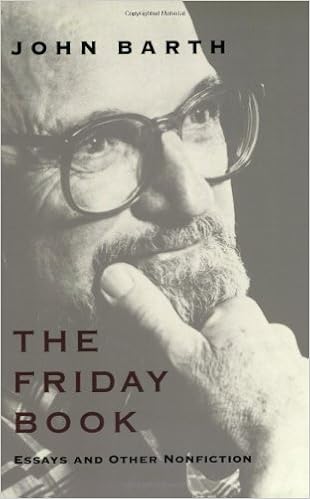 Reviewed by Jacob Laba
Reviewed by Jacob Laba
The Friday Book: Essay and Other Nonfiction
by John Barth
John Hopkins University Press
February 1997, Paperback, 304 pages, ISBN-13: 978-0801855573
When I first learned that the meta-virtuoso John Barth wrote nonfiction every Friday morning to stretch his writerly muscles, I couldn’t help but grow curious and indulge myself in his collection The Friday Book… oh, and what a choice it was!
Essays can often have a certain unapproachable quality. However, when you read Barth, you can’t expect a constant stream of seriousness, or at least seriousness in the most acceptable times. Even before the barrage of essays comes forth to dazzle us, under the heading “The Title of This Book,” he already starts with some unserious seriousness when reflecting on the various sorts of titles floating around in the literary world—while refraining from actually speaking of his title much at all. And, still before letting us readers jump into the work, he throws us meta crack-ats on subtitles of books, writing under “The Subtitle of This Book”: “Subtitles – like printed dedications, notes on titles, author’s introductions, forewords, sonnets and epistles dedicatory, and the rest – should be avoided. Get on with it. Get on with it,” before reluctantly, wildly, and duplicitously jabbing at subtitling for the next few paragraphs. He does something similar in the author’s introduction, so readers really think we know what we’re getting into.
But how surprised I was to see what was actually in these essays: hard-boiled seriousness! Well, a Barthian seriousness, but still seriousness. There is a still-witty but somewhat level-headed sort of seriousness—Barth tells us the tale of his twinship, twinning-twining of their dual identities and, most importantly, special little language. Then he divulges into more bizarre essays… in fact, the work finishes off regaling us readers with a super serious detailing of Scheherazade’s fecundity of 1001 Nights with a deep-dive into obstetrics, which was strangely enjoyable.
At the heart of the collection, though, is Barth’s infamous essay “The Literature of Exhaustion”, in which he sneaks up on well-regarded writers by tearing apart the view of postmodern literature… he asks, “do the writers most often called postmodernist share any aesthetic principles or practices as significant as the differences between them?” He also rears his colleague’s definition of postmodern literature which, put simply, is that the writer thrust into the loose category of postmodernism is more self-reflexive, more inclined to commentary on writing and artful composition than producing art in a meaningful way. Barth believes that if this is all there is to postmodern literature, then it is a rather infirm ‘movement’ if its purpose is commentary on the process of composing purpose, instead of serving to create artful purpose itself. Some postmodern writes that transcend this—Jorge Luis Borges and Italo Calvino, he mentions—that employ a synthesis or transcension of literature of the past and the recent, that touch on a diversity of human themes with the innovation and illusion of postmodern to prop them up. In his eyes, in Borges’s story “Pierre Menard, Author of the Quixote” does this to a pithy ideal, stating that Borges achieves an artistic victory as he “confronts an intellectual dead end and employs it against itself to accomplish new human work” the intellectual dead end being the aftermath of modernism and originality in literature itself.
Throughout The Friday Book we get a full breadth of who Barth is as a person. A strange writer. A serious literary critic and academic, with a just-as-serious comic in him. We also get to peek into his learnings, his inklings on life, his insights on the growth of his literary character, titled “Some Reasons Why I Tell the Stories I Tell The Way I Tell Them Rather Than Some Other Sort of Stories Some Other Way”. When the collection is finished, there is a sense of satisfaction, a sense that we have just bathed in a great deal of valuable impressions on literature, religion, art, life, meaning, signs and symbols, and, more than anything, the fun and rich life of John Barth.
About the reviewer: Jacob Laba is a writer and poet from El Cerrito, California. He has been published in the East Bay Times, Collidescope, Haiku, LitVegan, and is forthcoming elsewhere. Find him @the_vegan_writer on Instagram.